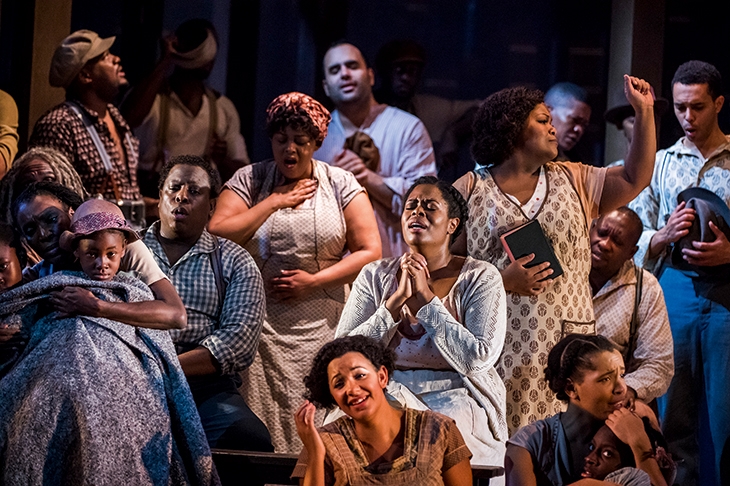Gershwin’s Porgy and Bess springs to life fully formed, and pulls you in before a word has been sung. A whirlwind flourish; the hectic bustle of violins and xylophone, and then a quick fade into an image of a woman cradling a child and ‘Summertime’, the very first number we hear sung. The aria’s fame actually serves the drama. The thrill of musical recognition as the curtain rises on an unfamiliar world is replaced by astonishment at the dramatic instinct that allows Gershwin to expend a melody like that before his story has even started, in the certain knowledge that what follows can, and absolutely will, live up to what for any composer other than Gershwin would be a once-in-a-lifetime inspiration.
English National Opera’s new production is one of those occasions where everything goes right — or at least, it feels as though it does while you’re in there, which is very nearly the same thing. Director James Robinson has grasped two essentials: firstly, that with an opera which is still far from being a repertoire piece, it doesn’t pay to muck about with the setting and spirit. And secondly, that in a barn like the Coliseum, you’d better fill that stage and put on a show. Michael Yeargan’s huge revolving set sketches in the balconies and tin roofs of Catfish Row while leaving its population clearly on display. Under Robinson’s direction that community is vividly, affectionately observed.
But god, that score — can it ever have been realised better than this? The choral sound is what really slays you, woven into Gershwin’s orchestral fabric, but rearing up at climactic moments to a massed cry whose depth and weight of emotion makes the air quiver. Against the chorus, and often emerging from it, is a uniformly excellent cast. Eric Greene plays Porgy with such ferocious optimism that it shades over into something close to madness. When, deprived of his crutches, he kills Crown (Nmon Ford, whose singing had the sheen of cold steel), it’s not just the bad guy who dies. After Bess leaves, and Greene’s handsome baritone — so gentle and proud in ‘Bess, You Is My Woman Now’ — disintegrates into jagged, rust-streaked pain, the defiance of the final chorus feels desperately upsetting.
Nicole Cabell’s Bess, meanwhile, reveals her vulnerability only slowly. She wears her face, and her warm, even-toned voice, like a mask — numbed by what she’s endured. Her last-ditch resistance to Crown’s brutality makes her final relapse into the hands of Sporting Life (a sidling, obscenely grinning Frederick Ballentine) all the more tragic. And yet you come out on a high. Perhaps the sense of hope is located in the opera’s evocations of Christian belief, channelled by Gershwin into that soul-shaking choral writing and the character of Serena, whose radiant affirmations of faith, as delivered by Latonia Moore’s searchlight soprano, would have had Richard Dawkins shouting Hallelujah.
Or perhaps it’s just the generosity and compassion of Gershwin’s score, and the alternating dazzle and tenderness of the ENO orchestra under John Wilson. All that energy, all that style and all that loving but unobtrusive care for the music’s inner voices merely served what Wilson has always insisted is his overriding artistic goal: to find a sound that lets the music speak. I’m not sure that every aspect of this production will revive well (the squeaky-clean costumes are presumably a concession to the co-producers at the New York Met, where audiences like their poverty to look expensive), but for now, who cares? This is thrilling, heartbreaking music drama and you need to see it.
The Merry Widow inhabits a different universe, but Opera North’s revival of Giles Havergal’s 2010 production, complete with sparky translation by Kit Hesketh-Harvey and an embassy ball’s worth of tiaras, epaulettes and moustache wax, proved some of the same points in a very different way. Not because the cast is stellar (though they’re all engaging and listenable), but because they seek and usually find the precise balance of sweet and sour that story and score demand. It’s mostly marzipan, obviously, but in playing ‘Vilja’ as a sort of intimate flashback, Maire Flavin’s Hanna and Quirijn de Lang’s Danilo became just believable enough to stop the whole Ruritanian confection from floating off in a champagne bubble.
Martin André conducted the Opera North orchestra with such colour and schwung that it practically became a character in its own right. The only misfire was at the end, where Havergal brings down the curtain on the final waltz, rather than the altogether fizzier finale that Lehar wrote, which served here for the curtain call. You can see why Havergal thought it might work: every musical instinct tells you that it’s wrong. As with Gershwin, so with Lehar. When you’re dealing with a master, it makes sense to trust them.






Comments